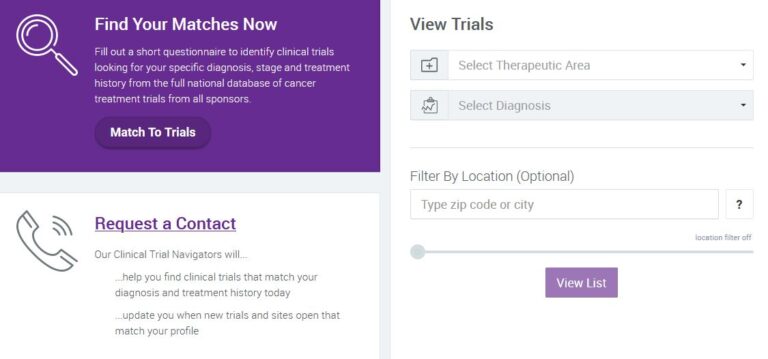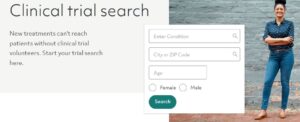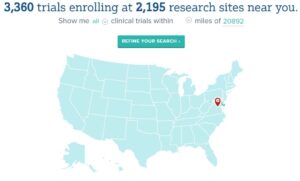Breast cancer clinical trials
Self advocacy saved my life," says Karen Peterson.

“Self advocacy is very important. Self advocacy saved my life,” says Karen Peterson.
“Cancer runs in my family. I am a childhood cancer survivor. At age 49, I was diagnosed with triple negative breast cancer. I went into gear building a treatment plan, vetting oncologists and getting information.”
“I was told that I had a lot of fighter cells. No one had ever told me that before, that a lot of fighter cells were sitting in the wings waiting to fight, but they needed a little help. My second opinion said to me you might want to think about genomic testing because you might have mutations that may be driving your cancer.”
“This information led me to seek a clinical trial. I sought out a principal investigator and sent him my information directly. I didn’t go through his clinical nurse, I back-doored my way in.”
The investigator called her back and told Karen he didn’t have a place in his current trial. “But then he said to me, and I can still hear his words, I have something coming down the pipeline that has not been listed on clinical trials.gov yet. “
“Twelve weeks after being diagnosed with metastatic triple negative breast cancer, I was in the trial, I was patient number one in the country. I had a 4% shot of this working. It was better than nothing. So I said, why not? I got lucky.”
The trial worked for her. “I had tumors in my lungs, my spines and my ribs and my pelvis. My immune system has been taught to recognize the cancer that’s there and kill it.”
“It’s important to take ownership of your health. Self advocacy is very important. Self advocacy saved my life. Become educated and I think that will empower you.”
An emotional 5-minute video from the American Association for Cancer Research.
Tammie Denyse's clinical trial changed standard of care for breast cancer
 When Tammie Denyse was 39 and a single mother with three children, she was diagnosed with breast cancer. After a lumpectomy, adjuvant chemotherapy and radiation therapy, her oncologist offered her an opportunity to participate in a clinical trial.
When Tammie Denyse was 39 and a single mother with three children, she was diagnosed with breast cancer. After a lumpectomy, adjuvant chemotherapy and radiation therapy, her oncologist offered her an opportunity to participate in a clinical trial.
“I’m not blind to the history in this country of medical experimentation on Black people, and, at first, I was hesitant to participate in the study,” she recalled. But when she found out that too few Black women were participating to know whether they were responding to the treatment, she joined the clinical trial.
The research changed the standard of care for women with breast cancer and minimized the impact of side effects on their lives. Denyse is now cancer-free.
“My experience with cancer empowered me to be assertive and to become an equal partner in the decision-making of my care, and I wanted other Black women experiencing a cancer diagnosis to have that same sense of empowerment.”
She and her sister launched Carrie’s TOUCH, a nonprofit breast cancer organization, to give a voice to Black women and to significantly increase the number of Black breast cancer survivors.
Source: Why Are Black Women Still Dying at Higher Rates Than White Women From Breast Cancer?
"I wasn't ready to die, I was the breadwinner for my family"

“I’m a miracle,” says Ricki Fairley. “After a double mastectomy, six rounds of standard of care chemotherapy, six weeks of radiation, and reconstruction, I was told that my triple negative breast cancer (TNBC) was gone. But almost exactly a year to the date of my initial diagnosis, the TNBC had come back on my chest wall. My doctor told me that I was now metastatic and to get my affairs in order—I had two years, at the most, to live.
This doctor had only seen two TNBC patients before me and both died within nine months. Her minimal experience with TNBC and lack of knowledge of Black Breast Cancer led her to believe that there were no treatment options left for me.
But I wasn’t ready to die. I was the breadwinner for my family and the rainmaker for my company. I felt the responsibility to give my daughter, who was still in college at the time, the education she deserved.
I did my own research and found the Triple Negative Breast Cancer Foundation, which recommended one of a very few oncologists in the US who understood TNBC. She put me on two experimental drugs that have now become standard of care treatments for TNBC. Today, I’m a ten-year breast cancer survivor with no evidence of disease.”
See “Ricki Fairley, Co-Founder of TOUCH, The Black Breast Cancer Alliance Shares Why Clinical Trial Participation Will Help Black Women Beat Breast Cancer” on the Ebony website (2022)
"Here I am today, living proof that these clinical trials do work."

“You ever heard of the saying He will not give you more than you can bear? I just always had that in my mind and I just didn’t give up,” says Tarshia Rivera.
“I had a rash on my left breast and as time went on it got bigger and then I felt the lump and then the breast started getting bigger and bigger.” Tarshia was diagnosed with stage 3 triple negative breast cancer and underwent a double mastectomy. But as she was finishing her radiation therapy, the cancer had already started to grow back.
Her youngest child was six. “I said I had to be strong, at least for him, I didn’t want him to grow up without his mom.”
Her physicians were able to find a clinical trial for her. “I was like, I just can’t give up now. I went through so much. The loss of my hair, the pain of crying, all these people who are behind me, I can’t let them down. So I said why not let me try this. And I jumped on board.”
Tarshia was enrolled in three different clinical trials and had a positive response in all of them. After the third trial, her physicians considered her in remission.
“Here I am today, living proof that these clinical trials do work,” she says. “I want to thank all the doctors and nurses for all the help that they’ve given me over seven years. I appreciate everything that they’ve done for me.”
“I did it and look at me now, I’m living proof. Don’t give up. Continue to go on your journey.”
A 5-minute video from the Florida Cancer Specialists & Research Institute.

Cancer clinical trials allow researchers to study innovative and potentially life-saving new treatments. The goal is to find treatments that are better than what’s currently available.
Placebos are rarely used in cancer treatment clinical trials. If participants don’t receive the study medication, they are always given the best available treatment for their particular cancer. This helps the researchers determine whether the study medication is better than the standard treatment.
A 2-minute video from Stand Up to Cancer
Reason one. You have a chance to receive treatment based on the latest research that is not yet available to others. Clinical trials are based on the best knowledge available for your kind of cancer.
Reason two. You’ll get high-quality care and be carefully monitored throughout the study.
Reason three. You add to the world’s knowledge about cancer and help to improve cancer care for future generations.
A 2-minute video from the National Cancer Institute
Black Americans make up more than 13% of the U.S. population. But in the clinical trials that led to FDA approval of four new breast cancer treatments in 2020, only 2% to 9% of participants were Black. Similarly, Hispanic or Latin Americans make up 18.5% of the U.S. population, but accounted for 0% to 9% of participants in those same trials.
One of these new treatments is a targeted therapy called Trodelvy, used to treat advanced-stage triple-negative breast cancer. Black women are twice as likely as White women to be diagnosed with triple-negative breast cancer in the United States. But only 7% of the Trodelvy trial participants were Black.
Source: “Why are people of color underrepresented in clinical trials?” at breastcancer.org

In eight clinical trials testing oral chemotherapy drugs for the treatment of breast cancer between 2009 and 2019, in which the race of the participants was recorded, less than six percent of the participants were Black or Hispanic women.
Black and Hispanic patients were vastly under-represented in cutting-edge precision oncology breast cancer clinical trials that are the future of cancer treatment. These trials, conducted between 2004 and 2017, test treatments targeted to specific genetic mutations a patient may have that drives their tumor growth.
Black representation was 38 percent lower and Hispanic representation 36 per cent lower than their proportions in the U.S. population in 38 breast cancer clinical trials. On the other hand, White representation was 32 percent higher and Asian representation 95 percent higher than their proportions in the U.S. population.
“Current personalized treatments that are broadly generalized to all individuals based on the presence or absence of a biomarker without fully studying the implications of such treatment in racial and ethnic minority populations may not be appropriate,” Sophia C Kamran, M.D., (left) of the Massachusetts General Hospital and her colleagues wrote.
Source: “Original Investigation | Diversity, Equity, and Inclusion Racial and Ethnic Disparities Among Participants in Precision Oncology Clinical Studies” by Christopher M. Aldrighetti et al.
Source: breastcancer.org
 “Clinical trials set the standards for breast cancer treatments, but barely include Black bodies…Which means that most breast cancer treatments have been and continue to be trialed on older white women,” says Ricki Fairley.
“Clinical trials set the standards for breast cancer treatments, but barely include Black bodies…Which means that most breast cancer treatments have been and continue to be trialed on older white women,” says Ricki Fairley.
“A treatment that works for an older, earlier stage white patient may not work the same for a young Black woman. The truth is, we can’t know without more research and data. In order to test how drugs work on Black bodies and keep Black Breasties from dying at higher rates, we need more Black women in clinical trials. But sadly, many Black women are never even offered clinical trial participation by their doctors.
This is a matter of life and death for Black women. We need to participate in clinical trials, if not for ourselves, for future generations of young, Black Breasties: our daughters, sisters, nieces and friends. Young Black women shouldn’t have to continue to rely on drugs that were not designed for them.”
See “Ricki Fairley, Co-Founder of TOUCH, The Black Breast Cancer Alliance Shares Why Clinical Trial Participation Will Help Black Women Beat Breast Cancer” on the Ebony website (2022)
Lack of diversity one reason why Black women have worse breast cancer outcomes?
Not being included in clinical trials may be one of the reasons that Black women have worse breast cancer outcomes than other racial and ethnic groups. Lack of diversity among clinical trial participants means that new cancer treatments are being tested in groups of people that are not representative of the broader patient population that will receive these treatments if they are approved.
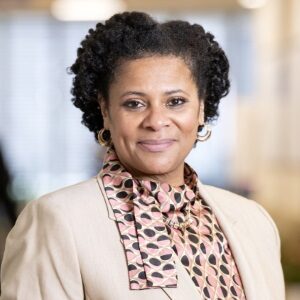 “We need everyone appropriately represented because we want to make sure a therapy works the same way and the side effects are the same in different populations,” said Karen Winkfield, MD, executive director of the Meharry-Vanderbilt Alliance in Nashville, Tennessee. “Sometimes a medicine might work better in one population than another. We need to learn these things up front so we can give each patient the right medicine at the right time.”
“We need everyone appropriately represented because we want to make sure a therapy works the same way and the side effects are the same in different populations,” said Karen Winkfield, MD, executive director of the Meharry-Vanderbilt Alliance in Nashville, Tennessee. “Sometimes a medicine might work better in one population than another. We need to learn these things up front so we can give each patient the right medicine at the right time.”
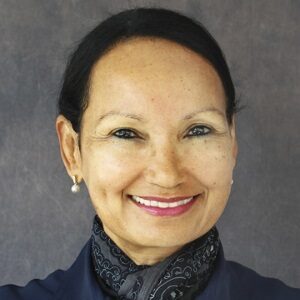 Up until recently, women of color have been largely left out of breast cancer research, including treatment trials and other types of studies that help doctors understand risk and risk reduction. “The majority of research in breast cancer screening, treatment, and hereditary susceptibility has been conducted on women with European ancestry,” said Lisa Newman, MD, of Weill Cornell Medicine and New York-Presbyterian in New York City. “We therefore face major gaps in knowledge. For example, we don’t know whether African American women might benefit from modified breast cancer screening recommendations, and we have an inadequate understanding of the genetics of triple-negative breast cancer.”
Up until recently, women of color have been largely left out of breast cancer research, including treatment trials and other types of studies that help doctors understand risk and risk reduction. “The majority of research in breast cancer screening, treatment, and hereditary susceptibility has been conducted on women with European ancestry,” said Lisa Newman, MD, of Weill Cornell Medicine and New York-Presbyterian in New York City. “We therefore face major gaps in knowledge. For example, we don’t know whether African American women might benefit from modified breast cancer screening recommendations, and we have an inadequate understanding of the genetics of triple-negative breast cancer.”
 “The reason we want diverse populations in clinical trials is that we want patients present with a range of genetic, social, economic, and geographic factors. We want all patients to benefit from clinical trials, and, when we assess new therapies, we want to understand how they will impact diverse populations,” said Lori Pierce, MD, of the University of Michigan and past president of the American Society for Clinical Oncology.
“The reason we want diverse populations in clinical trials is that we want patients present with a range of genetic, social, economic, and geographic factors. We want all patients to benefit from clinical trials, and, when we assess new therapies, we want to understand how they will impact diverse populations,” said Lori Pierce, MD, of the University of Michigan and past president of the American Society for Clinical Oncology.
Source: “Special Report: Increasing Racial Diversity in Breast Cancer Clinical Trials” (BreastCancer.org)
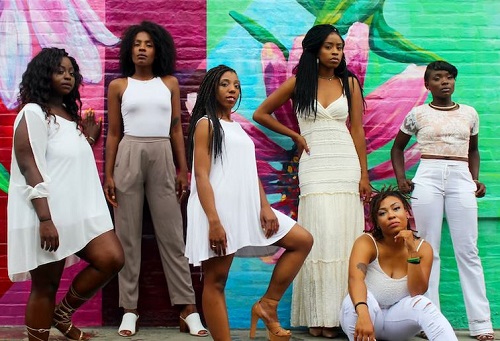
Not finding out about clinical trial opportunities. Many people of color don’t find out about clinical trial opportunities because their doctors don’t present them as an option. This can be a major barrier, because many people don’t know how to ask about, research, or find clinical trials on their own without a doctor’s support.
Overly strict eligibility criteria. Every clinical trial has guidelines about who is eligible to join to protect the safety of trial participants and ensure that they share certain characteristics, such as cancer type or previous treatments. But overly strict eligibility criteria have prevented many people from being able to enroll in clinical trials by excluding diseases that disproportionately affect people of color, such as high blood pressure (hypertension), diabetes, HIV, hepatitis B, and hepatitis C.
Travel and transportation. Clinical trial participants often have to travel to a clinical trial site for regular in-person visits which can be time-consuming and expensive. If you lack transportation, can’t take time off from work, or have family caregiving responsibilities, it can be more difficult to participate in a trial.
Out-of-pocket costs. Clinical trials usually pay for anything that is part of the trial, such as the study treatment you’ll receive, while health insurance usually covers routine care costs. But trial participants may have extra, out-of-pocket expenses such as parking, gas, taxis, airfare, and lodging that are not covered by the trial or health insurance. People may also face challenges with insurance coverage during the trial or lost income from time taken off work.
Lack of trust in the healthcare system. People of color may have personally experienced or observed discrimination in a healthcare setting. Or they may have received inferior care; research shows that Black and Hispanic women are less likely than white women to receive breast cancer treatment that adheres to medical guidelines.
All of these barriers contribute to the lack of diversity among clinical trial participants. But the barrier with the biggest impact may be that people of color simply aren’t being told about clinical trial opportunities or asked to participate. “If it’s not presented to you, how are you going to participate?” asks Eleanor M. Walker, MD, director of breast radiation oncology for the Henry Ford Health System in Detroit, Michigan.
Read more at “Why are people of color underrepresented in clinical trials? in breastcancer.org’s “Special Report: Increasing Racial Diversity in Breast Cancer Clinical Trials.”
When We Tri(al): a campaign to increase Black participation in clinical trials


“The purpose of our When We Tri(al) movement is to help our Black community understand the importance of breast cancer science. Black women need to know that our breast cancer deserves special attention and we all together need to advance the science,” says Ricki Fairley, triple-negative breast cancer (TNBC) survivor and the Co-Founder and CEO of TOUCH, The Black Breast Cancer Alliance.
A 4-minute video from TouchBBCA.
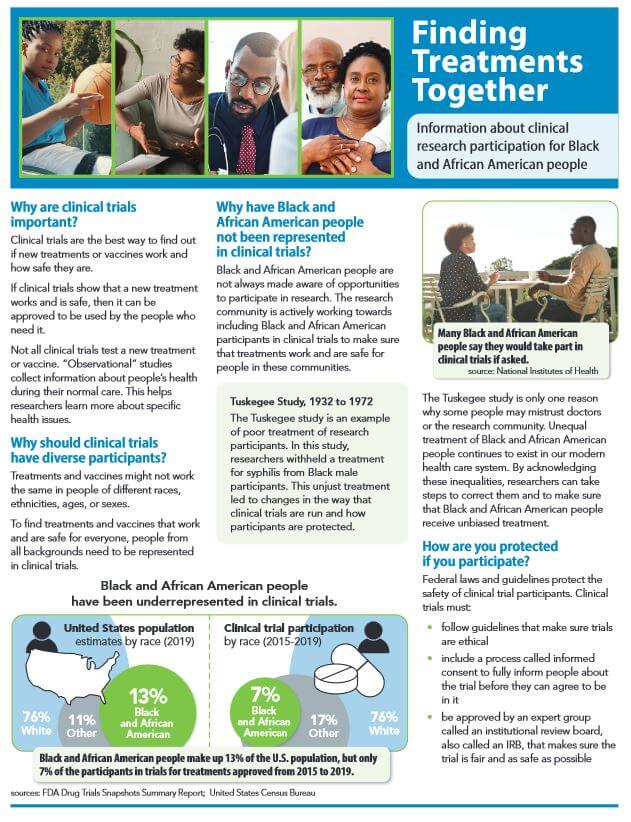
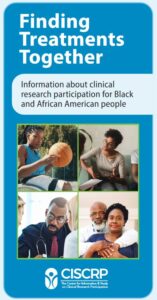
Source: Center for Information and Study on Clinical Research Participation, Inc.(CISCRP), a non-profit 501(c)(3) organization advocating for clinical research education.
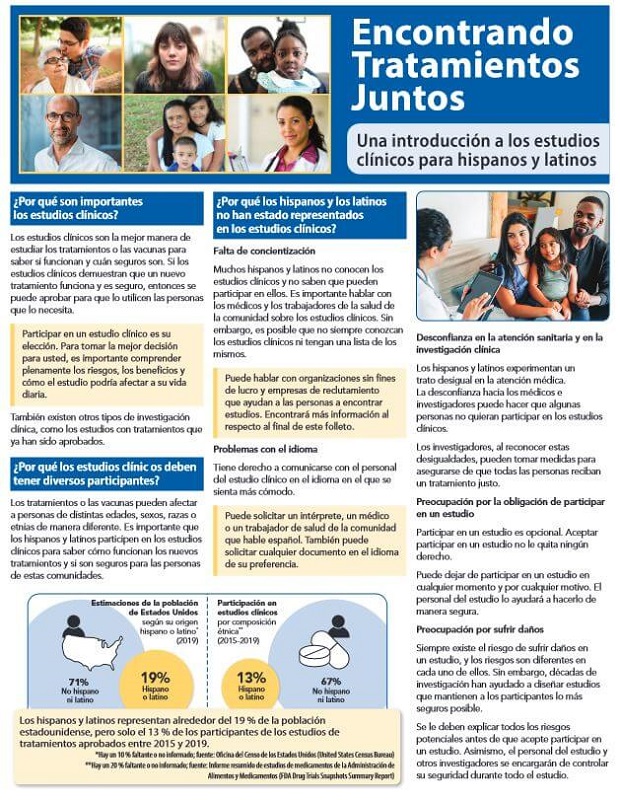
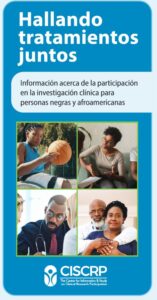
Source: Center for Information and Study on Clinical Research Participation, Inc.(CISCRP), a non-profit 501(c)(3) organization advocating for clinical research education.

A free, over-the-phone service that helps Black or African American (AA) cancer patients learn more about clinical trials.
The Peer Clinical Trials Support Program matches interested patients with a peer — a Black or African American cancer patient or survivor with experience participating in a cancer clinical trial. Patients have the opportunity to discuss their fears, questions, and concerns with a knowledgeable and empathetic guide, and hear from someone of a similar background who has “been there, done that.”
Source: Cancer Support Community
Interested in joining a breast cancer clinical trial, but  feeling overwhelmed or don’t know where to start? Here are some common questions about the challenges people face in finding and participating in a clinical trial and some helpful tips on how to find trials and make participating easier.
feeling overwhelmed or don’t know where to start? Here are some common questions about the challenges people face in finding and participating in a clinical trial and some helpful tips on how to find trials and make participating easier.
For the Special Report: Increasing Racial Diversity in Breast Cancer Clinical Trials, breastcancer.org spoke with experts and clinical trial participants about why diversity in clinical research matters, and how you can overcome common barriers that may be preventing you from participating in a breast cancer clinical trial.
- When is the right time to consider a clinical trial?
- How do I start the process of looking for a clinical trial?
- What should I expect when applying to enroll in a clinical trial?
- What can I ask of the trial coordinators to make it easier for me to participate in a trial?
- What costs may be involved with participating in a clinical trial and who can help me navigate the financial and insurance issues?
- What risks are involved with joining a trial and what safeguards help protect participants?
- How can I find other women who have participated in clinical trials to talk with about their experiences?
- How can I get support and make sure I get my questions answered at my appointments related to enrolling in a clinical trial?

- Help individuals who are interested in breast cancer research find studies that are right for them.
- List all of the U.S-based trials on ClinicalTrials.gov and Cancer.gov that are currently looking for volunteers.
- Provide accurate information about why clinical trials are important and how they are structured.
- Help researchers and site coordinators connect more efficiently with volunteers who are interested in their studies.
- Help care providers and patient navigators find trials for patients.
Source: Breastcancertrials.org

Susan G. Komen® Breast Care Helpline
For more information about clinical trials, please call our Helpline at 1-877 GO KOMEN (1-877-465-6636) or email at clinicaltrialinfo@komen.org to connect with a trained specialist. Our caring and trained staff provide support and education about clinical trials to help people gain a better understanding of clinical trials.
The Helpline offers breast cancer clinical trial education and support, such as:
- Knowing when to consider a trial
- How to find a trial
- How to decide which trial is best
- What to expect during a trial
- Information about clinical trial resources
Find Trials That May Be Right For You: Breast cancer patients at any stage can join a clinical trial. Breast cancer clinical trials study prevention, new screening tests and treatment options, as well as quality of life issues.
If you have early or locally advanced breast cancer, find a clinical trial
If you have metastatic breast cancer, find a clinical trial
More at Susan G. Komen
Help from government agencies
ClinicalTrials.gov is a database of privately and publicly funded clinical studies conducted in all 50 states and in 221 countries.
The website provides current information about clinical research studies for patients, their families and caregivers, health care professionals, and the public.
Each study record includes a summary of the study protocol, including the purpose, recruitment status, and eligibility criteria. Study locations and specific contact information are listed to assist with enrollment.
Information on ClinicalTrials.gov is provided and updated by the organizations and people that sponsor and carry out the studies. Listing a study does not mean it has been evaluated by the U.S. Federal Government.
Clinicaltrials.gov is a free service of the National Institutes of Health (NIH) and is maintained by the National Library of Medicine (NLM).
For more information about using the database, visit clinicaltrials.gov

“If you decide to look for trials on your own, learn how to find the right clinical trial for you with the National Cancer Institute’s six-step guide:
- Step 1: Gather details about your cancer
- Step 2: Find clinical trials
- Step 3: Take a closer look at the trials that interest you
- Step 4: Contact the team running the trial
- Step 5: Ask questions
- Step 6: Make an appointment
The NCI’s Cancer Information Service can also provide a tailored clinical trials search that you can discuss with your doctor. To reach them call 1-800-4-CANCER (1-800-422-6237) and select option 2. This is a free service. Keep in mind that the search results do not replace advice from your doctor.
Source: National Cancer Institute (2022)
Help from non-profit 501(c)3 charitable organizations
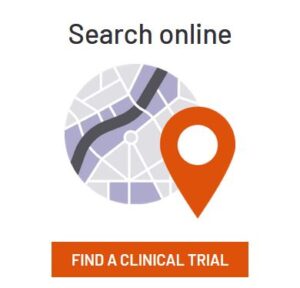
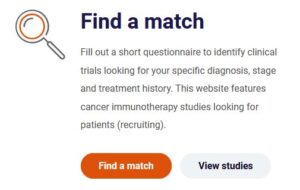

Our Cancer Immunotherapy Clinical Trial Finder will aid you in finding your answer to cancer. Understand the basics of cancer clinical trials, why clinical trials are so critical to our work, what things to consider about enrolling, and how to assist patients in finding clinical trials for which they may be eligible.
Source: Cancer Research Institute, a 501(c)3 charitable organization.
Standup to Cancer

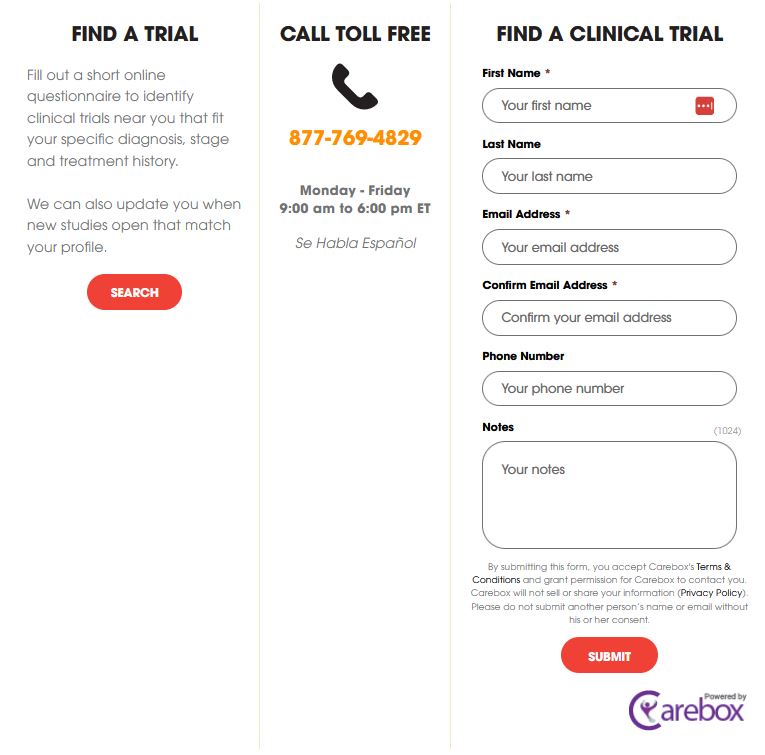
Source: Stand up to Cancer, a division of the Entertainment Industry Foundation (EIF), a 501(c)(3) charitable organization.
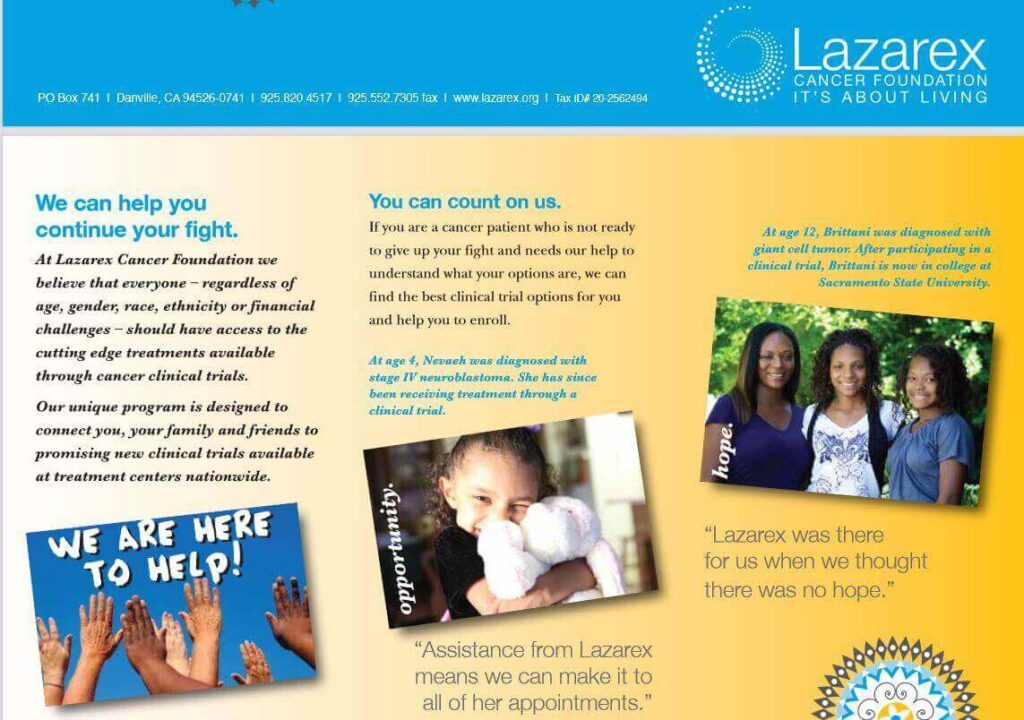
If you are a cancer patient who needs help identifying clinical trial options or needs financial assistance to attend a clinical trial, we’d like to hear from you. Our Patient Navigator can help you find the right clinical trial. We can also help you with the costs associated with participating in a clinical trial, including transportation and lodging.
For more information, email Lazarex or to speak with a Lazarex representative, call 925.820.4517.
Source: Lazarex Cancer Foundation, a 501(c)3 charitable organization.


Finding the right trial can be overwhelming. Search Clinical Trials is a free service designed to help people find clinical trials that are relevant to their medical and healthcare needs.
The CISCRP team will work with you to understand your options and help you find local clinical trials in your community, or as far as you would be comfortable traveling.
Source: Center for Information and Study on Clinical Research Participation, Inc.(CISCRP), a non-profit 501(c)(3) organization advocating for clinical research education.
Help from private companies
For over a decade, EmergingMed’s clinical navigators have facilitated clinical trial searches for nearly 500,000 patients. Request a Contact today to learn how we are able to help.
Source: EmergingMed

“As a digital patient engagement company, Antidote’s focus is on connecting patients to clinical trials — that’s why we have a moral imperative to support diversity, equity, and inclusion (DEI) initiatives that ensure clinical trial populations reflect those of the real world.”
Source: Antidote
“Our site has a comprehensive listing of all trials in the United States and is categorized to help you find it quick. ClinicalTrialsGPS has information on trials from all the leading pharmaceutical companies, academic institutions and trials ranging from Cancer to Diabetes and Vaccines to Osteoarthritis.”
“Our goal is to provide you with the most comprehensive, up to date information about ongoing clinical studies as well as a quick and easy way to participate. “
Source: Clinical Trials GPS
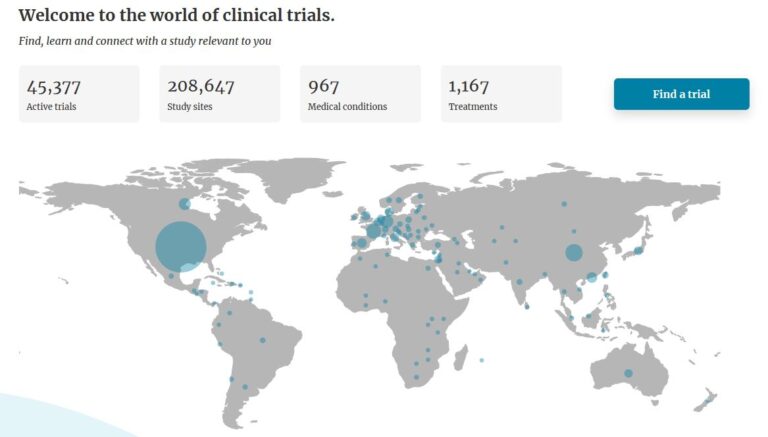
Search and browse to find a trial relevant to you. Read the trial details on eligibility, location and participation. You can also register to be notified when a trial you’re searching for begins. Find a trial near you.
Source: Center Watch



